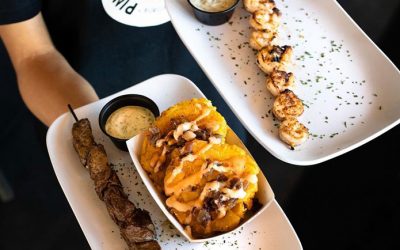There are only four tables inside a Fajita Pete’s. That’s not a setup that could work for a lot of restaurants, but when dine-in orders account for less than 10 percent of sales, a handful of seats is plenty. “We don’t just sell fajitas, we sell convenience,” says Pedro “Pete” Mora, founder of Houston-based Fajita Pete’s, where the majority of sales, about 90 percent, are from catering, delivery and pick-up orders—exactly how Mora intended it. From its 1,200-square-foot restaurants, the 10 locations of Fajita Pete’s across Texas put out fresh-grilled […]
Read MoreWith investor cash continuing to pile into the restaurant and delivery worlds, the biggest players are outlining plans to go their own unique directions. In a recent conversation with Caviar’s Anjarae Washington, head of Caviar For Teams and its new catering-focused acquisition Zesty, she said the company is preparing to take Zesty outside of its Bay Area home turf. New to M&A parenthood, San Francisco-based Square/Caviar acquired Zesty in April of this year. Washington said the purchase included Zesty’s staff of approximately 30 team members who are now integrated into […]
Read MoreThere is a lot of attention on the point of sale when it comes to food delivery. Numerous aggregators are playing in the space and some point of sale (POS) companies are figuring out integrations of their own as well. The POS provider Qu, formerly known as Gusto, has announced a new tool that would empower restaurant operators and brands to take on delivery in-house. But the platform promises technology tools typically only seen at pure-play third-party delivery firms or companies with a massive technology budget. Qu CEO Amir Hudda, […]
Read MoreIt’s the antithesis of the neighborhood ice cream truck: flats of microgreens delivered to farmers markets, restaurants, schools and some tony neighborhoods in Central Florida via the Superfood Wellness Wagon. “’On demand food is one of our taglines,’” says Jim Gale, founder of Mobile Greens Wellness, a health food growing and delivery company. The idea is to turn the customer’s packaged-food and can-laden pantry into a living pantry, so they can be “producers rather than consumers,” he points out. The Wellness Wagon is actually a trailer that holds 80 flats […]
Read MoreThe more delivery services the better it seems, at least for Miami-based Pincho Factory, which announced expanded partnerships with UberEats, Postmates and DoorDash as it looks to get its grilled skewers and burgers in the hands of more consumers. The third-party delivery services, along with online ordering from Olo, are rolling out at all 10 Pincho Factory locations this fall. “When seeking delivery providers that best fit Pincho’s needs, we believe we found the winning formula in these great partners who understood the brand and our goals for expanding our […]
Read MoreIt’s still a land rush in restaurant delivery, with an ongoing rush of major investments, new partnerships and new markets where on-demand delivery is still the new kid in town. The latest news is DoorDash’s partnership with Bringg, the Israel-based delivery operations platform. This new partnership will enable restaurants that use Bringg to seamlessly integrate DoorDash Drive, which is a service that allows restaurants to offer to delivery to customers directly with the restaurant to expand the size and reach of their delivery operations.
Read MoreA consumer behavior survey from consulting firm ChangeUp found the growth of restaurant delivery is not hurting dine-in traffic and could even spur visits. The survey of nearly 450 consumers who recently used common third-party delivery options noted 58 percent of those consumers said they eat in a restaurant as often or more often after ordering delivery. “Delivery services like DoorDash, Grubhub and UberEats are opportunities to build incremental sales and do not negatively impact dine-in occasions,” the report said. “It appears that these apps have the potential to convert […]
Read MoreJust how excited are investors about the ghost kitchen industry? Well, according to Kitchen United CEO Jim Collins, they are pretty eager. “I think we opened and closed the round in about two days,” said Collins. The outcome of that fervent desire for ghost kitchens across the country had Google Ventures leading a Series A worth $10 million altogether. Filling out the investor pool were original seed investors, which jumped back in, too, executing on their rights as original investors. For Collins, a serial entrepreneur, the excitement for the company […]
Read More










